New York City
June 22 - June 23, 2018, New York City
The CU Cities Conference 2018 convened graduate students and diverse professionals, from recent graduates to seasoned pros, from across industries, to explore compelling ideas about faith and its relevance to every facet of our lives. Graduates of Columbia, Dartmouth, Harvard, University of Pennslyvania, Princeton and Yale explored their role in becoming Christian leaders. Click here to watch the videos and click here to listen to the audio from the conference.
Katie Lentz, CU New York young professional: “The most impactful thing about this conference was the coming together of a network of people striving towards the same goal. It was so encouraging to gather with Christians from this city and other cities with the same Christ-centered personal mission in the workplace.”Photo Gallery
Click on one of the pictures below to access the photo gallery from the CU Cities Conference.
Vaclav Havel, in his essay Politics, Morality, and Civility, shares his thoughts on how society is established to produce a flourishing culture. Having come out of a dark period of communist rule that chose many of the tools and structures of a democratic system and turned them to other ends Havel knew well that structures ultimately rest on something much more fundamental. They rest on morality – our understanding of good and evil, and the willingness to pursue that which is good. Havel calls “living in truth”.
Greetings from New York!
Dr. William Hurlbut, professor at Stanford Medical School, spoke at a recent CU New York forum on “The Challenge and Opportunity of Gene Editing: Scientific and Ethical Considerations”. Prof. Hurlbut addressed the ethical issues associated with advancing biomedical technology, especially when applied to direct interventions in human life. The evening stands as an example of thoughtful Christians exploring both a deeper understanding of a key scientific advance, and the range of implications it contains. CU New York’s mission is to equip and encourage Christians in New York in engaging culture in redemptive and transformative ways. You can watch the video of the talk here.
A belated Welcome to 2017 — a year that promises to be eventful, no matter how you look at it. A verse that jumps to mind is Psalm 28: 7, The LORD is my strength and my shield; my heart trusts in Him, and he helps me. My heart leaps for joy, and with my song I praise Him. Because He is my strength, and because I trust in Him — my response must be joy, and this is how I look at the year ahead.
Greetings from New York!
Welcome to Fall — that is what has been going through my mind for the past week. Cooler temperatures are a joy to me; I look forward to this season starting early August, and this joy lasts until I am finally driven mad by the fixation on all things flavored pumpkin — usually by mid-October.
I’m always excited to be at this point in May — the promise of summer and the greater promise of newly arrived graduates in New York and other cities. They are excited to be done with their formal schooling (at least for a time) and many of us a little further down the path are excited for them as they begin to connect to the wider world of work and life that faith calls us into.
Greetings from New York!
During the past century it has been an interesting development where the celebration of Christmas has taken on greater social and cultural significance. Historically the church has elevated Easter, or Resurrection Sunday, as the more defining event to mark. The death of Jesus as the ultimate sacrifice for the sins of humanity, and His subsequent resurrection overcoming death and the power of Satan are defining factors in the uniqueness of the Christian faith. It resolves the overwhelming problem of the human condition and it points to a future where all is made whole. I hope this has been a remarkable season of hope and renewal for you.
Greetings from New York!
I’m not sure if you view this month in quite the same way as I do — a somewhat comical juxtaposition of the silliness/romantic celebration of Valentine's Day and the sobering start of the Lenten season when we consider the path of Christ as He approaches His crucifixion and resurrection. Certainly any serious celebration of the former would be rather empty without the tangible demonstration of the love of Christ shown for us in the latter.
Greetings from New York City!
There is much to relate in this letter, all of it encouraging. We seem to be in a season of great activity in a number of areas, all of which provide some wonderful opportunities for those of you in the New York area.
Excellent Additions to Your Reading List
The Square and the Tower: Networks and Power, from the Freemasons to Facebook
by Niall Ferguson
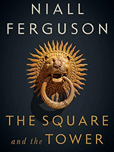
The 21st century has been hailed as the Age of Networks. However, in The Square and the Tower, Niall Ferguson argues that networks have always been with us, from the structure of the brain to the food chain, from the family tree to freemasonry. Throughout history, hierarchies housed in high towers have claimed to rule, but often real power has resided in the networks in the town square below. For it is networks that tend to innovate. And it is through networks that revolutionary ideas can contagiously spread. Just because conspiracy theorists like to fantasize about such networks doesn't mean they are not real. (Amazon)
The Common Rule: Habits of Purpose for an Age of Distraction
by Justin Whitmel Earley
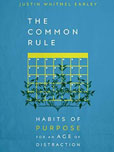
Twenty-first-century Christianity has experienced a much-needed renaissance in its theology of work, but it takes formational habits to work with the purpose we preach, and this ingredient is still largely missing from the conversation. In the meantime our workplaces are being fragmented by the distractions of technology, uncontrollable busyness, and the question of whether we want a job driven by purpose or upward mobility. This book addresses the need to pair our theology on the meaning of work with the formational practice of spiritual work habits in order to bring order and purpose back to the workplace - and to our lives.
True Paradox: How Christianity Makes Sense of Our Complex World
by David Skeel
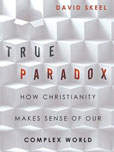
Although the twentieth century saw several landmark contributions to Christian apologetics, these Christian classics have lost some of their effectiveness in an era when America is more pluralistic than ever before and many Americans imagine that science has explained or will soon explain all of the mysteries of life. Skeel, however, argues that Christianity actually offers better explanations than materialism or other perspectives for many of the most important puzzles of our existence - such as our idea-making capacity, our perceptions of beauty and suffering, and our repeated optimism that we can create a truly just social order and repeated failure to do so.
On Reading Well: Finding the Good Life through Great Books
by Karen Swallow Prior

Reading great literature well has the power to cultivate virtue. Great literature increases knowledge of and desire for the good life by showing readers what virtue looks like and where vice leads. It is not just what one reads but how one reads that cultivates virtue. Reading good literature well requires one to practice numerous virtues, such as patience, diligence, and prudence. And learning to judge wisely a character in a book, in turn, forms the reader's own character.
Prior takes readers on a guided tour through works of great literature both ancient and modern, exploring twelve virtues that philosophers and theologians throughout history have identified as most essential for good character and the good life. (Amazon)
The Road to Character
by David Brooks
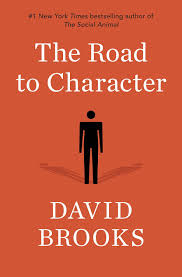 "Brooks focuses on the deeper values that should inform our lives. Responding to what he calls the culture of the Big Me, which emphasizes external success, Brooks challenges us, and himself, to rebalance the scales between our "résumé virtues"—achieving wealth, fame, and status—and our "eulogy virtues," those that exist at the core of our being: kindness, bravery, honesty, or faithfulness, focusing on what kind of relationships we have formed." (Amazon)
"Brooks focuses on the deeper values that should inform our lives. Responding to what he calls the culture of the Big Me, which emphasizes external success, Brooks challenges us, and himself, to rebalance the scales between our "résumé virtues"—achieving wealth, fame, and status—and our "eulogy virtues," those that exist at the core of our being: kindness, bravery, honesty, or faithfulness, focusing on what kind of relationships we have formed." (Amazon)A Hobbit, a Wardrobe, and a Great War: How J.R.R. Tolkien and C.S. Lewis Rediscovered Faith, Friendship, and Heroism in the Cataclysm of 1914-1918
by Joseph Loconte
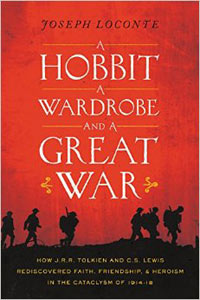 "The First World War laid waste to a continent and permanently altered the political and religious landscape of the West. For a generation of men and women, it brought the end of innocence—and the end of faith. Yet for J. R. R. Tolkien and C. S. Lewis, the Great War deepened their spiritual quest. Both men served as soldiers on the Western Front, survived the trenches, and used the experience of that conflict to ignite their Christian imagination. Had there been no Great War, there would have been noHobbit, no Lord of the Rings, no Narnia, and perhaps no conversion to Christianity by C. S. Lewis." (Amazon)
"The First World War laid waste to a continent and permanently altered the political and religious landscape of the West. For a generation of men and women, it brought the end of innocence—and the end of faith. Yet for J. R. R. Tolkien and C. S. Lewis, the Great War deepened their spiritual quest. Both men served as soldiers on the Western Front, survived the trenches, and used the experience of that conflict to ignite their Christian imagination. Had there been no Great War, there would have been noHobbit, no Lord of the Rings, no Narnia, and perhaps no conversion to Christianity by C. S. Lewis." (Amazon)by Stephen Hess
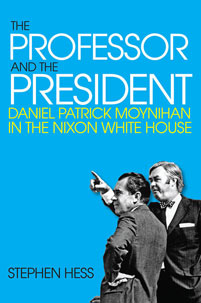 "Written by Stephen Hess, who served on the White House staff during both the Eisenhower and Nixon presidencies, this book is a uniquely personal account of what happened behind closed doors when conservative Richard Nixon made Daniel Patrick Moynihan, a liberal Ivy League professor, his top urban affairs adviser." (Brookings)
"Written by Stephen Hess, who served on the White House staff during both the Eisenhower and Nixon presidencies, this book is a uniquely personal account of what happened behind closed doors when conservative Richard Nixon made Daniel Patrick Moynihan, a liberal Ivy League professor, his top urban affairs adviser." (Brookings)Ministers at War: Winston Churchill and His War Cabinet
by Jonathan Schneer
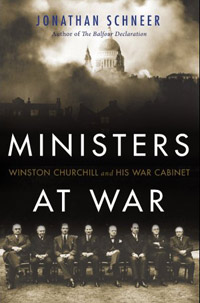 "Ministers at War tells the gripping story of how the man who certainly saved Britain and arguably saved western civilization managed his cabinet "team of rivals," a coalition of men who had spent most of their interrelated, pre-war political lives at daggers drawn." (First Things)
"Ministers at War tells the gripping story of how the man who certainly saved Britain and arguably saved western civilization managed his cabinet "team of rivals," a coalition of men who had spent most of their interrelated, pre-war political lives at daggers drawn." (First Things)To Change the World: The Irony, Tragedy, & Possibility of Christianity in the Late Modern World
by James Davison Hunter
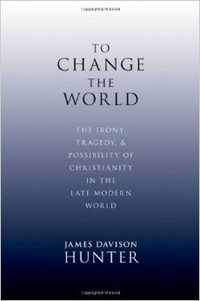 "The call to make the world a better place is inherent in the Christian belief and practice. But why have efforts to change the world by Christians so often failed or gone tragically awry? And how might Christians in the 21st century live in ways that have integrity with their traditions and are more truly transformative?
"The call to make the world a better place is inherent in the Christian belief and practice. But why have efforts to change the world by Christians so often failed or gone tragically awry? And how might Christians in the 21st century live in ways that have integrity with their traditions and are more truly transformative? Hunter argues that all too often current political theologies worsen the very problems they are designed to solve. What is really needed is a different paradigm of Christian engagement with the world, one that Hunter calls "faithful presence"-- an ideal of Christian practice that is not only individual but institutional; a model that plays out not only in all relationships but in our work and all spheres of social life." (Amazon)
Subscribe Today






































